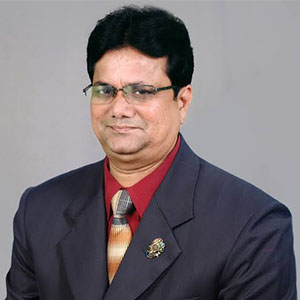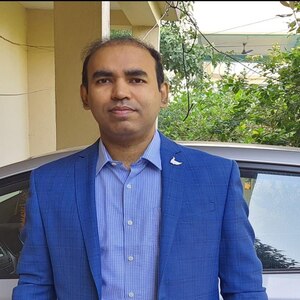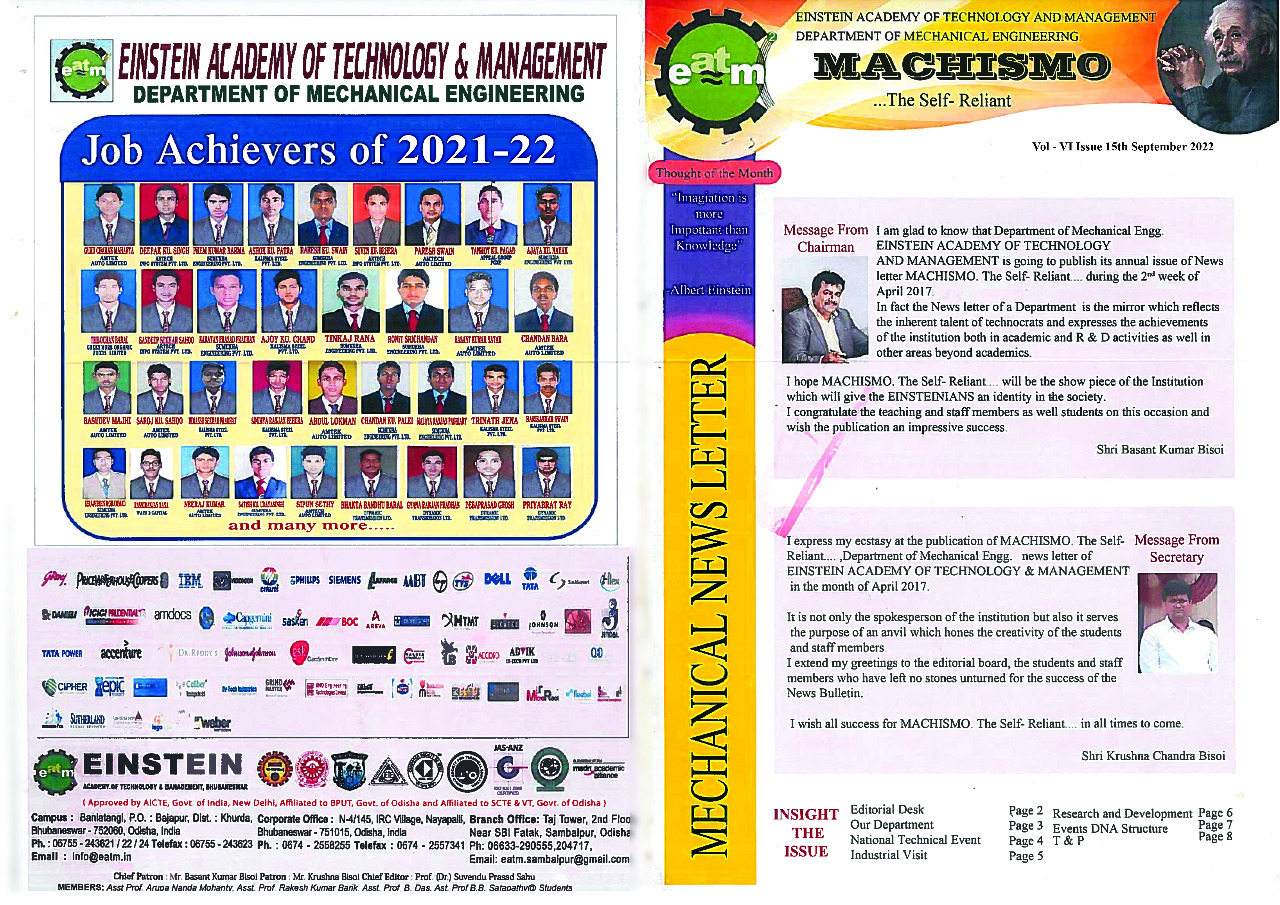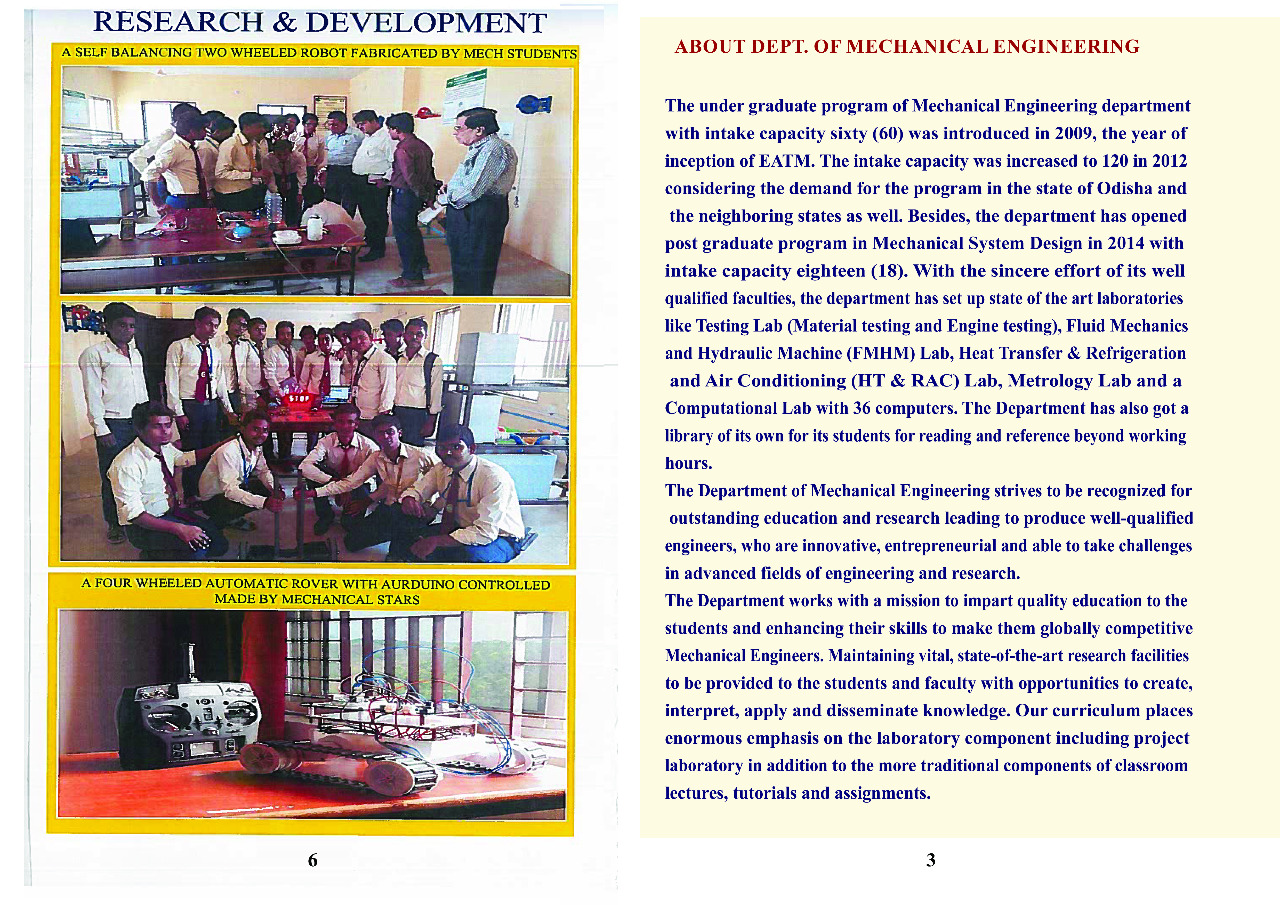Mechanical Engineering
- Introduction
- HOD’s Message
- Faculty Members
- Vision & Mission
- Courses Offered
- COs
- POs
- PEOs & PSOs
- Laboratory Facilities
- Opportunities
- Achievements
-
Seminar, Workshop,
Conference, FDP, STTP - Value Added Courses
- Student Project/Internship
- News Letter & Magazine
The under graduate program of Mechanical Engineering department with intake capacity sixty (60) was introduced in 2009, the year of inception of EATM. The intake capacity was increased to 120 in 2012 considering the demand for the program in the state of Odisha and the neighboring states as well. Besides, the department has opened post graduate program in Mechanical System Design in 2014 with intake capacity eighteen (18). With the sincere effort of its well qualified faculties, the department has set up state of the art laboratories like Testing Lab (Material testing and Engine testing), Fluid Mechanics and Hydraulic Machine (FMHM) Lab, Heat Transfer & Refrigeration and Air Conditioning (HT & RAC) Lab, Metrology Lab and a Computational Lab with 36 computers. The Department has also got a library of its own for its students for reading and reference beyond working hours.
The Department of Mechanical Engineering strives to be recognized for outstanding education and research leading to produce well-qualified engineers, who are innovative, entrepreneurial and able to take challenges in advanced fields of engineering and research.
The Department works with a mission to impart quality education to the students and enhancing their skills to make them globally competitive Mechanical Engineers. Maintaining vital, state-of-the-art research facilities to be provided to the students and faculty with opportunities to create, interpret, apply and disseminate knowledge. Our curriculum places enormous emphasis on the laboratory component including project laboratory in addition to the more traditional components of classroom lectures, tutorials and assignments.
The process of learning is extremely important in life. What you learn, how you learn and where you learn play a crucial role in developing ones intellectual capability, besides career. Hence on behalf of Department of ME department, I welcome all you to EATM, Bhubaneswar. The Department of Mechanical Engineering started its journey in the year 2009. The department offers B.Tech (Mechanical Engineering) with an intake of 120 students and M.Tech (Mechanical System Design) with an intake of 18 students. The department has highly experienced and dedicated faculty to impart quality education to the students. In addition to academics, the department strives for the holistic development of students by arranging various activities like workshops, seminars, conferences and industrial visits. The department has well equipped laboratories and we believes that our students are molded to become successful engineers, managers and future ethical leaders with required knowledge, analytical skills and creativity to develop innovative solutions to challenging problems who are not only committed to the industry but also to the society.
EATM also augments the academic knowledge by training its Technocrats to face the challenges in life by providing many value added courses to enhance their career prospects. We provide excellent infrastructure, best teaching faculty in order to ensure quality education. Thus we are confident that our students will emerge as assets not only to this institution, but also to the country at large. On our part we can assure you of our whole hearted support whenever and wherever it is desired. Together we have a great future. We look forward to keeping you apprised of our progress as we move into that future with great optimism. In this Era of startups we also encourage our students to become entrepreneurs which are part of our Program Educational Objectives. Many projects are going on in the area of Renewable energy like solar energy based water heater, Wind power generation on Highways by fast moving vehicles, and in the area of waste management like Bio-Gas projects etc to introduce our students to new area. If you have further questions after browsing this website, please do not hesitate to contact us. You may also correspond with individual faculty members, or contact them by email, using the addresses shown on the faculty pages. Our department looks forward to contribute in solving the technological challenges of the society with active participation from all sections of the society. Thank you for visiting us.
Dr. Jitendra Narayan Biswal
(Associate Professor & HOD)
Vision
To achieve excellence in imparting quality education and research with an aim to produce state-of-the-art mechanical engineers to cope-up with the ever-changing industrial and social requirements.
Mission
M1: Delivering quality academics in emerging and innovative fields of Mechanical Engineering to empower the students to meet Industry Standards.
M2: Educating and guiding students about professional and ethical responsibilities to build leadership and entrepreneurship skills for their career development.
M3: Providing unremitting efforts to link both teaching and research to expedite the research activities among faculty and students.
|
Post Graduate (M. Tech)
|
Mechanical System Design (18 Intake)
|
|
Under Graduate (B. Tech)
|
Mechanical Engineering (120 Intake)
|
|
Diploma
|
Mechanical Engineering (60 Intake)
|
Programme Outcomes (POs)
PO1: Engineering knowledge: Apply the knowledge of mathematics, science, engineering fundamentals, and an engineering specialization to the solution of complex engineering problems.
PO2: Problem analysis: Identify, formulate, review research literature, and analyze complex engineering problems reaching substantiated conclusions using first principles of mathematics, natural sciences, and engineering sciences
PO3: Design/development of solutions: Design solutions for complex engineering problems and design system components or processes that meet the specified needs with appropriate consideration for the public health and safety, and the cultural, societal, and environmental considerations.
PO4: Conduct investigations of complex problems: Use research-based knowledge and research methods including design of experiments, analysis and interpretation of data, and synthesis of the information to provide valid conclusions.
PO5: Modern tool usage: Create, select, and apply appropriate techniques, resources, and modern engineering and IT tools including prediction and modeling to complex engineering activities with an understanding of the limitations.
PO6: The engineer and society: Apply reasoning informed by the contextual knowledge to assess societal, health, safety, legal and cultural issues and the consequent responsibilities relevant to the professional engineering practice.
PO7: Environment and sustainability: Understand the impact of the professional engineering solutions in societal and environmental contexts, and demonstrate the knowledge of, and need for sustainable development.
PO8: Ethics: Apply ethical principles and commit to professional ethics and responsibilities and norms of the engineering practice.
PO9: Individual and team work: Function effectively as an individual, and as a member or leader in diverse teams, and in multidisciplinary settings.
PO10: Communication: Communicate effectively on complex engineering activities with the engineering community and with society at large, such as, being able to comprehend and write effective reports and design documentation, make effective presentations, and give and receive clear instructions.
PO11: Project management and finance: Demonstrate knowledge and understanding of the engineering and management principles and apply these to one’s own work, as a member and leader in a team, to manage projects and in multidisciplinary environments.
PO12: Life-long learning: Recognize the need for, and have the preparation and ability to engage in independent and life-long learning in the broadest context of technological change.
PROGRAM EDUCATIONAL OBJECTIVES (PEOs)
PEO-1: Graduates will acquire fundamental knowledge in basic and core subjects, and implement the same in solving, planning, executing the real-life problems in the field of Mechanical Engineering.
PEO-2: Graduates will be able to apply their skills in experimentation, analysis, computation, simulation to find out workable solutions to technological challenges in core and allied areas of Mechanical Engineering including higher studies.
PEO-3: Graduates will be able to possess good communication skill, all round personality development, ethical practices, leadership quality and understand his role towards the society and environmental sustainability.
PROGRAM SPECIFIC OUTCOMES (PSOs)
PSO1: Mechanical Graduates will possess a sound technical knowledge and will be capable to develop core competency in diversified fields such as production, design, thermal, industrial and other allied sectors.
PSO2: Graduates will exhibit effective communication, leadership, team building, problem-solving and decision-making skills along with software and creative knowledge by understanding contemporary issues.
PSO3: Graduates will adapt to the rapidly changing environment in the areas of mechanical engineering and scale new heights in their profession through lifelong learning.v
- Lathes
- Universal Milling Machine
- Radial Drilling Machines
- Slotting Machine
- Tool & Cutter Grinder
- Shaping Machine
- Air Conditioning Test Rig
- Blower Test Rig
- Steam Turbine Test Rig
- Two Stage air compressor Test Rig
- Francis & Turgo Impulse Turbines
- Pelton and various types of pumps
- Bernouli & Flow Meters
- Operating Cut Section of Engines (Petrol & Diesel)
- Multi Cylinder Engines with Dynamo Meter (Petrol & Diesel)
- Two stroke Engines and other standard equipments.
- Composite Wall Apparatus
- Natural & Forced Convection Apparatus
- Emissivity Apparatus
- Pin Fin Apparatus
- Stefen Boltzman Apparatus
- Vibration Analyser
- Universal Governor
- Electrical Gyroscope
- Fly wheel and axle System
- Slip Gauges
- LVDT Trainer Kit
- Strain Gauge Trainer Kit
- Tool Makers Microscope
- Hydraulic Trainer Kit
- Pneumatic Trainer Kit
- Fatigue Testing Machine
- Torsion Testing Machine
- Hardness Testing Machine
- Impact Testing Machine
- Universal Testing Machine
- Compression Testing Machine
- Intel Core i3 Processor
- 19″ Monitor
- 4 GB RAM
- 500 GB HDD
- Printers
Mechanical engineering is the evergreen branch among all other branches of engineering. They deal with the concepts of mechanics, thermodynamics, robotics, kinematics, structural mechanics, fluid mechanics, power sector, refrigeration, air conditioning sector and aerospace. There is a great scope of mechanical engineering now-a-days. It is expanding beyond its boundaries and more of interdisciplinary in nature. It is one of the oldest branches of engineering. This field of engineering is the broadest of all engineering fields, job prospects on offer for skilled engineer are plenty and unending. They can find employment in both government as well as private sector. Mechanical engineers are required to design, test, manufacture, install, operate and maintain a wide array of machines and mechanical systems that are used in industries. Almost every industry requires mechanical engineers. From researching and developing better machines to testing and managing production in an industry, all these roles come under the domain of a mechanical engineer. There is a great scope of job avenues for mechanical engineers in India. Few of them are listed below:
- • AUTO CAD• CATIA• PRO-E(CREO)• MAT LAB• SOLIDWORKS









